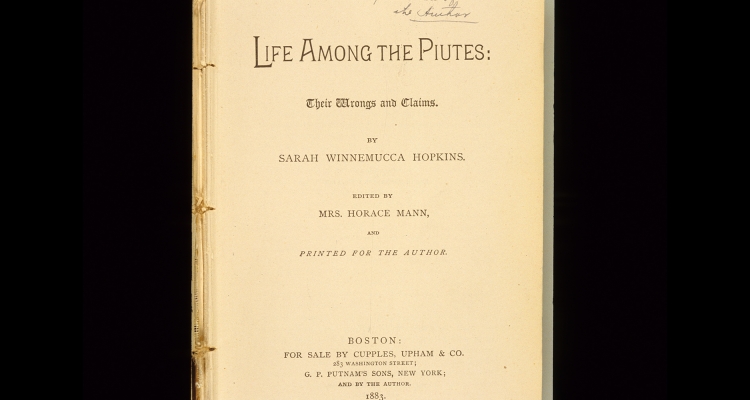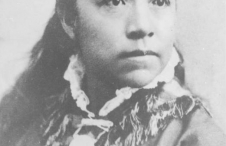Sarah Winnemucca's Life Among the Piutes
In 1883 Sarah Winnemucca sat writing at a rapid pace in the Boston home of her friend and supporter, the New England reformer Elizabeth Peabody. The book in progress would not be Sarah's first publication. A letter she wrote in 1870 to inform the Nevada Superintendent of Indian Affairs about the condition of her tribe, the Paiutes, in northwestern Nevada, was subsequently reprinted in several newspapers, in Harper's magazine, and in A Century of Dishonor, Helen Hunt Jackson's 1881 polemic. In 1882 a pessimistic article by Sarah expressing doubt that American Indians would survive appeared in The Californian.
The forthcoming autobiography, however, was by far Sarah's most ambitious and influential written work. Sarah Winnemucca was then one of the most famous Native women in America. She had served the United States Army as interpreter and messenger during the Bannock War of 1878. Ever devoted to the cause of her people, she had traveled to Washington, D.C. in 1880 to plead for the release of Paiutes exiled to the Yakama Reservation. In 1883 she was in the midst of barnstorming the Northeast, giving eloquent speeches to large crowds about the plight of her people and sharply criticizing the reservation system.
Sarah's speaking engagements figured in the book so quickly completed because she used what she had been saying in her lectures. In 268 pages she combined the history of her tribe and a description of Paiute culture with her own autobiography and several letters from her supporters. The book was above all a tract intended to win support for the Paiutes at a time when abuses continued at the reservations and some exiles remained at Yakama. In so far as she relates her own story, she concentrates on deeds performed on behalf of her tribe as an Indian warrior would do in a traditional coup tale. Because Sarah's written English lagged behind her fluent speech, Mary Mann, Elizabeth Peabody's sister, agreed to correct her errors in spelling and punctuation, and Peabody's expertise in publishing assured the prompt appearance in print of Life Among the Piutes: Their Wrongs and Claims by Sarah Winnemucca Hopkins (her married name) in 1883.
It was the first book written by an American Indian woman and the first by a Native American west of the Rocky Mountains. Today Life Among the Piutes is once more in print, often read, frequently cited by historians, and carefully analyzed by literary scholars. Sarah's statue representing Nevada was unveiled in 2005 at U.S. Capitol Statuary Hall, Washington, D.C. She holds her book in one hand.
The full text of Sarah Winnemucca's Life Among Piutes is available here.

